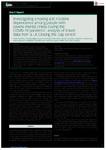Investigating smoking and nicotine dependence among people with severe mental illness during the COVID-19 pandemic: analysis of linked data from a UK Closing the Gap cohort
| dc.contributor.author | Peckham, Emily Jane | |
| dc.contributor.author | Allgar, Victoria | |
| dc.contributor.author | Crosland, S | |
| dc.contributor.author | Heron, P | |
| dc.contributor.author | Johnston, G | |
| dc.contributor.author | Newbronner, E | |
| dc.contributor.author | Ratschen, E | |
| dc.contributor.author | Spanakis, Panagiotis | |
| dc.contributor.author | Wadman, R | |
| dc.contributor.author | Walker, L | |
| dc.contributor.author | Gilbody, Simon | |
| dc.date.accessioned | 2021-11-11T12:54:56Z | |
| dc.date.available | 2021-11-11T12:54:56Z | |
| dc.date.issued | 2021-05 | |
| dc.identifier.issn | 2056-4724 | |
| dc.identifier.issn | 2056-4724 | |
| dc.identifier.other | e86 | |
| dc.identifier.uri | http://hdl.handle.net/10026.1/18322 | |
| dc.description.abstract |
<jats:title>Summary</jats:title> <jats:p>Smoking rates are higher for people who use mental health services, which contributes substantially to health inequalities. Smoking can lead to worse COVID-19 outcomes, yet it remains unclear whether smoking has changed for people who use mental health services. We examined smoking patterns in a large clinical cohort of people with severe mental illness, before and during the pandemic. We found high levels of nicotine dependence and heavier patterns of smoking. Although some people had reported quitting, it is likely that smoking inequalities have become further entrenched. Mental health services should seek to mitigate this modifiable risk and source of poor health.</jats:p> | |
| dc.format.extent | e86- | |
| dc.format.medium | Electronic | |
| dc.language | en | |
| dc.language.iso | eng | |
| dc.publisher | Royal College of Psychiatrists | |
| dc.subject | Severe mental illness | |
| dc.subject | smoking cessation | |
| dc.subject | smoking | |
| dc.subject | COVID-19 | |
| dc.subject | schizophrenia | |
| dc.title | Investigating smoking and nicotine dependence among people with severe mental illness during the COVID-19 pandemic: analysis of linked data from a UK Closing the Gap cohort | |
| dc.type | journal-article | |
| dc.type | Journal Article | |
| plymouth.author-url | https://www.webofscience.com/api/gateway?GWVersion=2&SrcApp=PARTNER_APP&SrcAuth=LinksAMR&KeyUT=WOS:000642436900001&DestLinkType=FullRecord&DestApp=ALL_WOS&UsrCustomerID=11bb513d99f797142bcfeffcc58ea008 | |
| plymouth.issue | 3 | |
| plymouth.volume | 7 | |
| plymouth.publication-status | Published | |
| plymouth.journal | BJPsych Open | |
| dc.identifier.doi | 10.1192/bjo.2021.45 | |
| plymouth.organisational-group | /Plymouth | |
| plymouth.organisational-group | /Plymouth/Faculty of Health | |
| plymouth.organisational-group | /Plymouth/Faculty of Health/Peninsula Medical School | |
| plymouth.organisational-group | /Plymouth/REF 2021 Researchers by UoA | |
| plymouth.organisational-group | /Plymouth/REF 2021 Researchers by UoA/UoA01 Clinical Medicine | |
| plymouth.organisational-group | /Plymouth/Research Groups | |
| plymouth.organisational-group | /Plymouth/Research Groups/Plymouth Institute of Health and Care Research (PIHR) | |
| plymouth.organisational-group | /Plymouth/Users by role | |
| plymouth.organisational-group | /Plymouth/Users by role/Academics | |
| dc.publisher.place | England | |
| dc.identifier.eissn | 2056-4724 | |
| dc.rights.embargoperiod | Not known | |
| rioxxterms.versionofrecord | 10.1192/bjo.2021.45 | |
| rioxxterms.licenseref.uri | http://www.rioxx.net/licenses/all-rights-reserved | |
| rioxxterms.type | Journal Article/Review |


